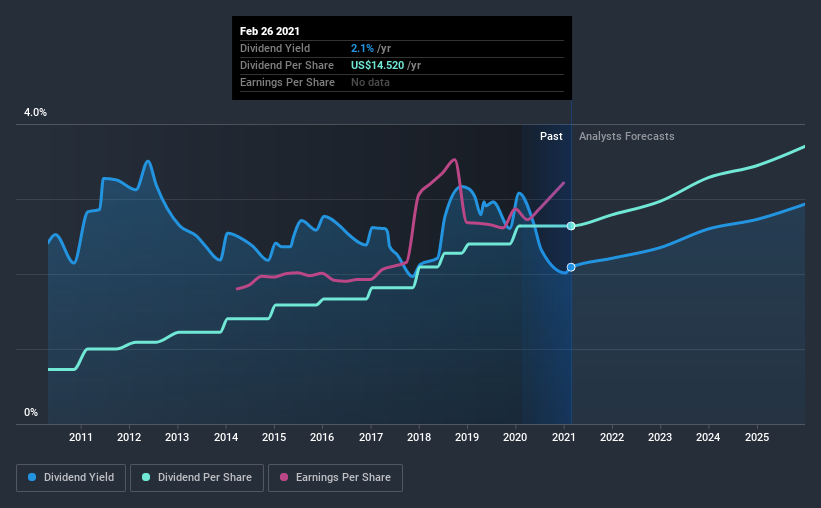Is It Smart To Buy BlackRock, Inc. (NYSE:BLK) Before It Goes Ex-Dividend?
Some investors rely on dividends for growing their wealth, and if you're one of those dividend sleuths, you might be intrigued to know that BlackRock, Inc. (NYSE:BLK) is about to go ex-dividend in just 4 days. This means that investors who purchase shares on or after the 4th of March will not receive the dividend, which will be paid on the 23rd of March.
BlackRock's next dividend payment will be US$4.13 per share, and in the last 12 months, the company paid a total of US$14.52 per share. Last year's total dividend payments show that BlackRock has a trailing yield of 2.1% on the current share price of $694.5. Dividends are an important source of income to many shareholders, but the health of the business is crucial to maintaining those dividends. As a result, readers should always check whether BlackRock has been able to grow its dividends, or if the dividend might be cut.
See our latest analysis for BlackRock
Dividends are typically paid out of company income, so if a company pays out more than it earned, its dividend is usually at a higher risk of being cut. That's why it's good to see BlackRock paying out a modest 45% of its earnings.
Companies that pay out less in dividends than they earn in profits generally have more sustainable dividends. The lower the payout ratio, the more wiggle room the business has before it could be forced to cut the dividend.
Click here to see the company's payout ratio, plus analyst estimates of its future dividends.
Have Earnings And Dividends Been Growing?
Businesses with strong growth prospects usually make the best dividend payers, because it's easier to grow dividends when earnings per share are improving. Investors love dividends, so if earnings fall and the dividend is reduced, expect a stock to be sold off heavily at the same time. This is why it's a relief to see BlackRock earnings per share are up 9.8% per annum over the last five years.
The main way most investors will assess a company's dividend prospects is by checking the historical rate of dividend growth. Since the start of our data, 10 years ago, BlackRock has lifted its dividend by approximately 14% a year on average. It's encouraging to see the company lifting dividends while earnings are growing, suggesting at least some corporate interest in rewarding shareholders.
To Sum It Up
Has BlackRock got what it takes to maintain its dividend payments? It has been growing its earnings per share somewhat in recent years, although it reinvests more than half its earnings in the business, which could suggest there are some growth projects that have not yet reached fruition. In summary, BlackRock appears to have some promise as a dividend stock, and we'd suggest taking a closer look at it.
So while BlackRock looks good from a dividend perspective, it's always worthwhile being up to date with the risks involved in this stock. Case in point: We've spotted 1 warning sign for BlackRock you should be aware of.
A common investment mistake is buying the first interesting stock you see. Here you can find a list of promising dividend stocks with a greater than 2% yield and an upcoming dividend.
This article by Simply Wall St is general in nature. It does not constitute a recommendation to buy or sell any stock, and does not take account of your objectives, or your financial situation. We aim to bring you long-term focused analysis driven by fundamental data. Note that our analysis may not factor in the latest price-sensitive company announcements or qualitative material. Simply Wall St has no position in any stocks mentioned.
Have feedback on this article? Concerned about the content? Get in touch with us directly. Alternatively, email editorial-team (at) simplywallst.com.

 Yahoo Finance
Yahoo Finance 
